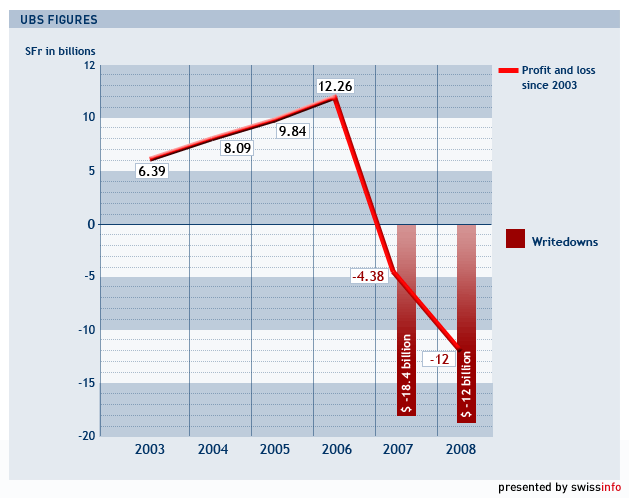UBS “will never be the same again”

Switzerland's largest bank UBS may have incurred irreparable damage but will not suffer the same fate as fallen United States giant Bear Stearns, observers believe.
Investors seemed to hold the same opinion as the bank’s share price rallied despite news of a further $19 billion (SFr19 billion) writedown and the announced departure of chairman Marcel Ospel on Tuesday.
But UBS’s dream of building one of the top performing investment banks now lies in tatters and it faces the further challenge of persuading rich investors against jumping ship from its wealth management division.
“I think the bank will never be the same again,” Professor Hans Geiger, director of Zurich University’s Swiss Banking Institute told swissinfo.
Opinion is split on whether UBS, Europe’s worst affected bank from the US subprime mortgage collapse, will suffer further losses in the coming months.
The bank still has exposure to some $31 billion of risky residential-mortgage backed investments, and this figure does not take into account leveraged loans it has issued and other shaky asset classes.
But Geiger believes that Ospel’s resignation signals an end to nasty surprises.
“Ospel said in December that he was part of the solution, so the fact that he has left suggests that he stayed on for as long as it took to clear the desk for his successor,” he said.
No Bear Stearns
However, Zurich Cantonal Bank analyst Andreas Venditti told swissinfo that he could not rule out more writedowns. “There is still exposure, so the story of how this issue will develop may not be over,” he said.
But both experts agreed that there is little chance of UBS suffering the same fate as US investment bank Bear Stearns, which had to be sold for a fraction of its value in March to avoid going under completely.
“Bear Stearns did not have other lines of business to provide long term, stable funding for the group – they have a totally different funding structure. UBS can fall back on its retail and wealth management lines that are very healthy,” said Venditti.
Plans by UBS to raise a further SFr15 billion of funds through a rights issue have more to do with reinforcing its cash buffer against possible further shocks than needing money to keep on trading, he added.
But the biggest problem for UBS could be preventing rich clients from taking their money elsewhere. UBS is the world’s largest wealth manager, the cornerstone of its success.
Unhappy clients
The bank potentially faces a number of unhappy clients and possible lawsuits after it cut the value of so-called auction rate securities last week, which it had previously sold to customers who believed them to be safe investments.
UBS is among a number of banks being investigated by the US district court in Manhattan under suspicion of selling the product under false pretences.
“There is some discussion that clients are leaving the bank, but it does not appear to be a big issue,” said Geiger. “The bank wrote down SFr19 billion, but the first quarter loss is SFr12 billion, so the cash is still flowing in.”
swissinfo, Matthew Allen in Zurich
UBS endured a tough 2007, starting with the collapse of its hedge fund Dillon Read Capital management. Two months after that, in July, chief executive Peter Wuffli abruptly departed without clear explanation.
In October of last year, UBS said it would cut 1,500 jobs in its investment banking arm, including that of its head Huw Jenkins. UBS chief financial officer, Clive Standish, left at the same time.
Later that month the bank announced it was writing off SFr4.2 billion on subprime losses and SFr726 million pre-tax loss for the third quarter – the first quarterly loss in nine years.
In December UBS said another $10 billion would be written off as the US subprime crisis deepened. It also announced plans for a SFr13 billion funding plan from Singapore and Middle East investors, which was passed by shareholders in February.
A further $4 billion was written off in January, bringing the total losses to around SFr20 billion. This total was virtually doubled with April’s announcement.
Releasing its annual report for 2007 on Tuesday, the Federal Banking Commission said it had performed its job as supervisor “in a fully extensive manner” during the sub-prime crisis.
The Swiss banking watchdog admitted it had been surprised by the speed and extent of the crisis but said it had acted exactly the same as its large Anglo-Saxon counterparts.


In compliance with the JTI standards
More: SWI swissinfo.ch certified by the Journalism Trust Initiative




You can find an overview of ongoing debates with our journalists here. Please join us!
If you want to start a conversation about a topic raised in this article or want to report factual errors, email us at english@swissinfo.ch.